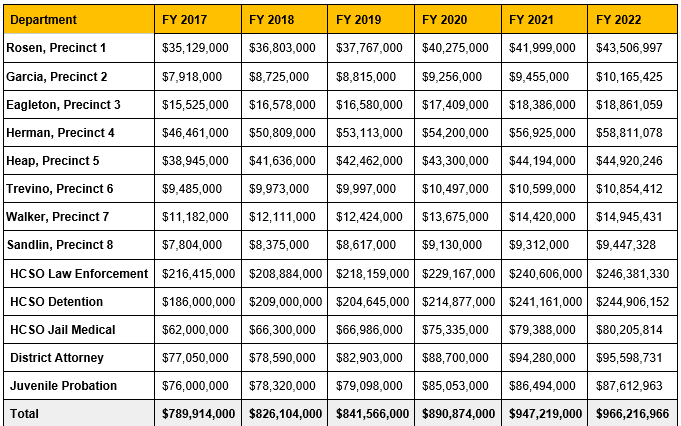Major Initiatives
Supporting Law Enforcement and First Responders
Under Judge Hidalgo’s leadership, Harris County has increased the budgets for every law enforcement agency in the county, including Constables and the District Attorney. We’ve invested millions to support our law enforcement as they focus on the most violent crimes by approving additional overtime funding for detectives in the Harris County
Sheriff's Office’s Violent Crimes, Adult Special Crimes, and Child Abuse Units. The County has improved information sharing, expedited investigations, and targeted investigations focusing on repeat offenders and organized criminal activity in known hotspots. Additionally, unused public safety funds have been identified and
reinvested to address recent increases in gun-related crime.

In 2022, approved an additional $20 million in ARPA funds to continue the work of reducing the court backlog. Funds will support evidence management, such as the work of going through 911 audio tapes and body camera footage; funding to sustain positions across the Clerk, Courts, Public Defender and District Attorney Offices; and additional funding for our Children’s Assessment Center, which investigates child abuse cases.
Reducing Harris County’s Court Case Backlog
Justice delayed is justice denied and while some categories of crime are increasing, thousands of criminal cases are pending in Harris County. As more and more time passes from when a crime is committed to the resolution of a case, victims feel ignored, perpetrators feel empowered, and those accused who are innocent feel left behind.
To help the judicial branch of our government move through this backlog of criminal cases, Harris County Judge Lina Hidalgo and Commissioners Court have passed:
- Funding for visiting judges to help support our associate judges get through cases.
- A major and historic $15M investment in technology for law enforcement which makes body cam systems more efficient, making necessary evidence available more
quickly to speed up processing of court cases.
- The approval of $600,000 dollars in funds to expand jury operations.
- Support for the Texas legislature to add three additional criminal district courts in Harris County.
Clean Streets, Safe Neighborhoods
Blighted buildings, dark streets, and unsafe and abandoned structures serve as incubators of crime and gun violence. That’s why we passed a new $50 million Clean Streets, Safe Neighborhoods program -- a research-based crime prevention and neighborhood safety program that uses data to target county neighborhoods where decay and abandonment are driving violent crime. The program will improve street lighting, sidewalks, and visibility in residential areas, address longstanding blighted and abandoned structures, restore vacant lots, and implement other improvements shown to enhance public safety.
Holistic Assistance Response Teams
To reduce crime we have to address the root causes of crime which are often directly related to health and social challenges like mental illness and substance use disorders. In order to do this Harris County Commissioner's Court is designating $5 million to create Holistic Assistance Response Teams (HART) to help free up law
enforcement from having to deal with calls involving mental illness, substance use, homelessness, and social welfare. HART teams are staffed with trained behavioral and mental health responders.
Gun Violence Interruption Program
Harris County’s innovative $6 million Gun Violence Interruption Program addresses gun violence in our community directly and stops violence before it happens:
- First, the program connects with people at risk by identifying individuals & locations that are most highly impacted by violence, including hospital patients who are victims of serious violent injuries.
- Second, it targets the root causes of gun violence by assigning aforementioned people at risk with caseworkers from a variety of disciplines to help with services like mental health counseling, substance use treatment, employment, and support exiting gangs.
- Third, it enlists community leaders to fight back at the neighborhood level and stop violence before it
happens. Workers identify ongoing conflicts by talking to key people in the community about disputes, recent arrests or prison releases, and other situations and use mediation techniques to resolve them peacefully.
Precision Policing
The “precision policing” initiative strategically pinpoints and attacks crime in the specific geographical areas in Harris County where violent crime is concentrated:
- First, this initiative uses data, analytics, and mapping to concentrate policing in micro zones, currently seven hotspots that we know suffer from heightened rates of violent crime.
- Second, the plan increases police visibility in those areas, prioritizing street-level deterrence and the arrest of repeat offenders.
- Third, the Harris County Sheriff’s office partners with these neighborhoods before, during, and after the program concludes to communicate what they're doing, why, and get the input of these communities to build and maintain trust.
Crime Prevention Through Environmental Design Program
The Harris County Crime Prevention Through Environmental Design (CPTED) program is one part of our aggressive efforts to tackle and reduce crime, clean up the streets in neighborhoods where decay and abandonment are driving violent crime, and ultimately contribute to keeping our communities safe.
The Women’s Reentry Program
The Women’s Reentry Program provides mental health support, trauma counseling, education and vocational training, substance abuse support, and other services for women housed in the Women’s Center Jail. These services not only proactively work to reduce recidivism, but also provide women with life-changing job training, care, and support systems that will ultimately help them, their families, and our communities.
The Teledeputy Program
The new $1.7 million Teledeputy program will allow officers to respond remotely to non-emergency calls, such as needing to file a police report after a car break-in or reporting an abandoned vehicle. The Teledeputy Program is expected to reduce response wait times from an average of over 14 minutes to less than 10 minutes. The Teledeputy Unit is another example of how Harris County is giving law enforcement the 21st-century tools they need to do their jobs most effectively, and ultimately better protect the community.